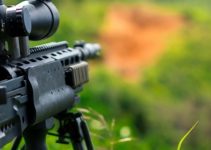Gun Laws in Nebraska
Contents
Purchasing firearms in the state of Nebraska does not require a permit. As long as shotguns, handguns, and rifles are purchased from a licensed dealer, no permit is necessary. The state of Nebraska defines a handgun as any firearm that has a sixteen-inch barrel or less or any firearm that was originally designed to be fired while being held in one hand. Rifles, handguns, and shotguns do not need to be registered to the Nebraska law enforcement.
 Owners also do not need to be licensed to possess a shotgun, handgun, or rifle. No permit is needed to carry a rifle or a shotgun, as stated through Nebraska law. The law does state that a permit is necessary to carry a handgun, which became effective as of the first of January 2007. This kind of permit is called a concealed weapons permit and can be acquired through completion of the proper safety courses, necessary background checks, and eligibility.
Owners also do not need to be licensed to possess a shotgun, handgun, or rifle. No permit is needed to carry a rifle or a shotgun, as stated through Nebraska law. The law does state that a permit is necessary to carry a handgun, which became effective as of the first of January 2007. This kind of permit is called a concealed weapons permit and can be acquired through completion of the proper safety courses, necessary background checks, and eligibility.
Nebraska is bordered by South Dakota to the north. It also shares borders with Iowa, Missouri, Kansas, Colorado and Wyoming. The state of Nebraska is divided into two (2) time zones, and its largest city is Omaha. Open carry is legal in Nebraska with a valid license to carry, and You can have a handgun in Your vehicle without a permit so long as it is clearly visible.
Certificate for Possessing a Firearm
To receive, sell, or purchase a handgun requires a certificate. Certain circumstances allow no certificate to be needed. These include the purchase or sale of an antique handgun, a firearms dealer through federal licensing acquires the gun, a law enforcement agency makes the transfer or purchase, or the transfer is temporary.
When a transfer is for temporary purposes, the individual acquiring the gun must be visible by the dealer at all times, be on the shooting facility premises, or be a member of the gun holder’s family–sibling, spouse, parent, uncle, aunt, child, grandparent, nephew, or niece.
Certificate applications are to be processed through the police chief or the sheriff in the county of residence. During this process a background check will be made after two days of filing, which will cost five dollars. The police chief or the sheriff will then determine if the certificate is to be granted or denied. If a certificate is denied, the reason for the denial will be presented to the individual in written form. A certificate can only be acquired by those who are twenty-one years of age or older and is only valid by the state of Nebraska for a three-year time period.
If a certificate has been revoked or denied, an appeal can be issued within ten days to the county court of residency. The appeal will need to contain the reasons why the certificated was denied or revoked and will need to include a ten-dollar filing fee. Within thirty days a decisions will be issued by the court.
Carrying Firearms in Vehicles
Nebraska permits anyone who is legally allowed to possess a firearm to carry it openly in a vehicle without a permit. Long guns and handguns may be carried openly (however it is illegal to carry a loaded shotgun in a vehicle), however a loaded handgun must be visible from outside the vehicle.
Self-defense Laws
Nebraska has a modified form of Castle Doctrine but no SYG law. There is no duty to retreat when in Your dwelling or place of business. You may use force, including deadly force, in defense of yourself or others if You reasonably believe it is necessary to prevent imminent death, SBI, kidnapping, or rape.
Nebraska Firearms Dealers
Nebraska law states that licensed dealers are required to check certifications, certification numbers, and picture identification before a purchase or transfer can be made. This also includes manufacturers and importers and excludes the checking of other dealers, manufacturers, collectors, or importers.
Possession Eligibility
Only certain individuals under law are eligible to possess firearms. These excludes those under the age of eighteen, felony convictions using firearms, misdemeanors using firearms, the chemically dependent, alcoholics, and the mentally unstable. Privileges can be reestablished after certain periods of time, in most cases.
Carry in Restaurants That Serve Alcohol
Yes, subject to the “No Gun Signs” provision above. Nebraska only prohibits carrying in establishments that derive more than one-half of their total income from the sale of alcohol. This does not include the bar or bar area of a restaurant – You are prohibited from carrying into these areas. You can carry your firearm into a restaurant that serves alcohol, but you are prohibited from consuming alcohol while carrying a firearm.
Open Carry (Without a Valid Permit/License)
Open carry is legal in Nebraska, but state preemption allows local governments to regulate the open carrying of firearms. Nebraska preemption only covers the carrying of “concealed firearms.” Places listed in the “Criminal Provisions” above apply to those who open carry. The Minimum age for open carry is 18. For open carry in a vehicle, the firearm must be clearly visible.
Background Checks
Background checks are not required for purchases of long guns. A person acquiring a handgun must have either a handgun certificate or a CCP and has therefore been subjected to a background check.
Reciprocal Carry
By statute, Nebraska will recognize another state’s license to carry if that state recognizes Nebraska’s license:
“A valid license or permit to carry a concealed handgun issued by any other state or the District of Columbia shall be recognized as valid in this state under the Concealed Handgun Permit Act if (1) the holder of the license or permit is not a resident of Nebraska and (2) the Attorney General has determined that the standards for issuance of such license or permit by such state or the District of Columbia are equal to or greater than the standards imposed by the act.”
Since there is no national carry license, as with the other states, some states are reciprocal with Nebraska and some are not. Anyone contemplating reciprocal carry should check with the official list maintained by the Nebraska AG at the point in time the reciprocal carry is to occur. All states add and delete states with which they have reciprocity agreements over time.
Criminal Provisions
Under Nebraska law, a license to carry a handgun is not valid in any of the following places or circumstances, whether it is issued by Nebraska, or a person is carrying pursuant to reciprocity between his or her state of license and Nebraska:
- Police, sheriff, or Nebraska State Patrol station or office
- Detention facility, prison, or jail
- Courtroom or building which contains a courtroom
- Polling place during an election
- Meeting of the Legislature or a committee of the Legislature
- Financial institution
- Professional or semiprofessional athletic event
- A school building, grounds, vehicle, or school sponsored activity or athletic event, including:
- A public school
- A private school
- A denominational school
- A parochial elementary, vocational, or secondary school
- A private post-secondary career school
- A community college
- A public or private college, junior college, or university
- Place of worship
- Hospital, emergency room, or trauma center
- Political rally or fundraiser
- An establishment having a license issued under the Nebraska Liquor Control Act that derives over one-half of its total income from the sale of alcoholic liquor
- Private property where there is a prohibition against carrying concealed firearms
- Any employer may prohibit employees from carrying concealed handguns in vehicles owned by the employer
- While consuming alcohol or while the permit holder has remaining in his or her blood, urine, or breath any previously consumed alcohol or any controlled substance
- A permit is required in order to purchase a handgun, and You must pass a background check to obtain this permit.
- Into or onto any other place or premises where handguns are prohibited by state law or by the establishment itself


